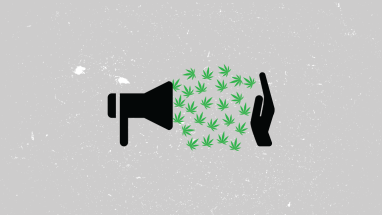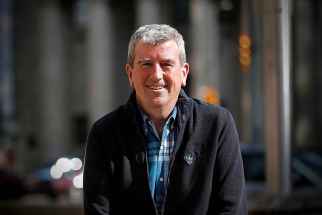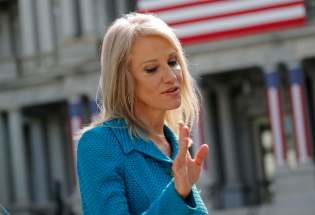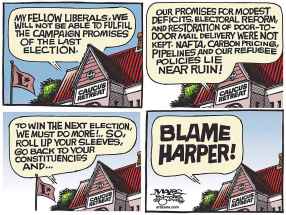The journey to First Contact Producers describe overcoming the obstacles and basking in the success of breakthrough APTN show
Read this article for free:
or
Already have an account? Log in here »
To continue reading, please subscribe:
Monthly Digital Subscription
$0 for the first 4 weeks*
- Enjoy unlimited reading on winnipegfreepress.com
- Read the E-Edition, our digital replica newspaper
- Access News Break, our award-winning app
- Play interactive puzzles
*No charge for 4 weeks then price increases to the regular rate of $19.00 plus GST every four weeks. Offer available to new and qualified returning subscribers only. Cancel any time.
Monthly Digital Subscription
$4.75/week*
- Enjoy unlimited reading on winnipegfreepress.com
- Read the E-Edition, our digital replica newspaper
- Access News Break, our award-winning app
- Play interactive puzzles
*Billed as $19 plus GST every four weeks. Cancel any time.
To continue reading, please subscribe:
Add Free Press access to your Brandon Sun subscription for only an additional
$1 for the first 4 weeks*
*Your next subscription payment will increase by $1.00 and you will be charged $16.99 plus GST for four weeks. After four weeks, your payment will increase to $23.99 plus GST every four weeks.
Read unlimited articles for free today:
or
Already have an account? Log in here »
Hey there, time traveller!
This article was published 18/09/2018 (2642 days ago), so information in it may no longer be current.
When the new Winnipeg-produced TV series First Contact aired in a three-night special on APTN last week, it touched off a national discussion about racism, reconciliation, and the potential for change in bigoted opinons.
The show’s premise put those issues in stark light. Six white Canadians, all of whom confessed to holding stereotyped views of Indigenous people, spent one month visiting Indigenous communites across the land.
That journey took them from Winnipeg, where they met North End advocate Michael Champagne and walked with Bear Clan Patrol, to Nunavut and the West Coast. Along the way, they confronted their own expectations.
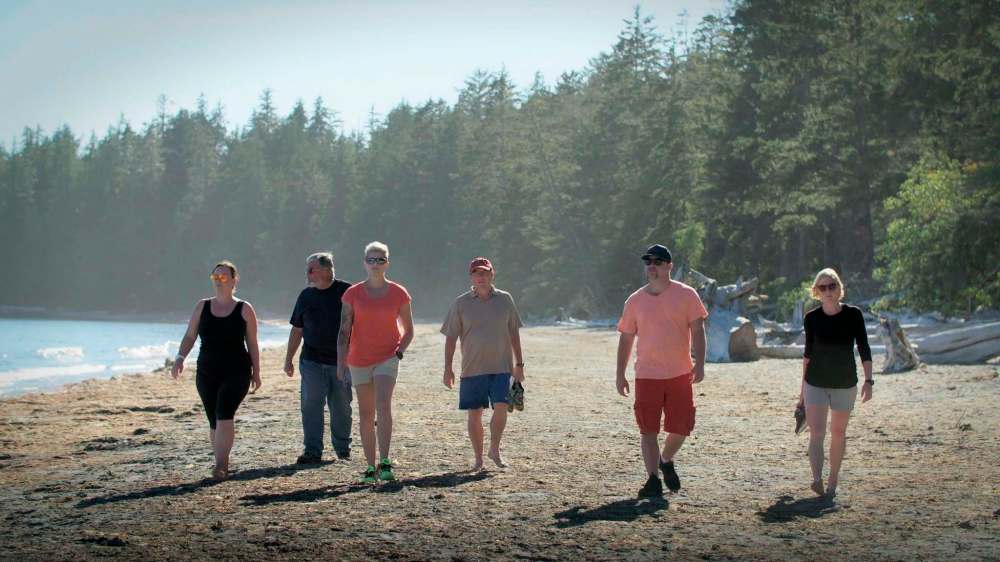
Now, with all three episodes streaming online at APTN.ca, producers hope to keep the discussion going.
Last week, the Free Press sat down with Winnipeg executive producers Vanessa Loewen, who is Metis, and Stephanie Scott, who is Anishinaabe, to talk about the show’s breakout success — and the ensuing reactions.
This interview has been condensed for space and focus.
***
WFP: The genesis of the show began in 2014, with a similar show in Australia. After securing the rights to launch a version in Canada, producers started looking for broadcast sponsorship. APTN hopped on board right away.
But a second broadcast sponsor initially proved elusive: one outlet, in rejecting the pitch, called the idea “inauthentic.” At last, Ontario broadcaster TVO signed on. The show will air on that station this winter.
Vanessa Loewen: We ended up with two small broadcasters, who showed us they were unafraid, and that they were willing to come on this journey with us, regardless of how tough it would be… we ended up with the program we ended up with because of the faith our partners put in us. That’s the best result we could have hoped for.
Stephanie Scott: It’s amazing. I think if we had actually ended up in a mainstream broadcast situation, we probably would have been silenced a little. I can’t see the same kind of show going forward or being aired on that national level to the degree we were allowed to, and that’s a gift.
WFP: Casting the show presented an unusual challenge. How do you attract six people willing to confess bigoted opinions on camera, but who would also be open to changing those views as their journey progresses?
Vanessa Loewen: People are so interested with the casting process. It’s something that most shows don’t talk about, I think because most shows like The Bachelor, or Big Brother, you just want to be on TV, or you want to compete.
We treaded a fine line of trying to get people who were bold. We made a callout for people… with strong views and opinions who wanted to go on a trip across Canada. We started off that way. As people bubbled to the surface and got pushed further along the casting process, then we were clear with them.
Stephanie Scott: There was no deception. We asked them their thoughts about Indigenous peoples in Canada, and they were pretty clear with their thoughts… they were saying this on camera. They were completely fine with it.
Vanessa Loewen: Had we been deceptive, we would have lost them. They would simply have not played ball with us when they showed up. But we certainly didn’t put out a call for just racist people.
Stephanie Scott: (laughing) Yeah, going into Indigenous communities, sign up. We probably would have got some, too.
WFP: Of the six participants, all three women and the youngest of the three men experienced significant changes in their opinions of Indigenous people. The two older men did not. What seemed to be the primary difference?
Vanessa Loewen: What we learned with those who changed, a theme that they kept echoing, was that they hadn’t been taught so much. Every time they made a realization, like with residential schools: “oh, we weren’t taught this.” Or, “We don’t know about treaties…” And as soon as they knew it, they changed.
Our biggest obstacle to getting through these barriers between the two communities is education.
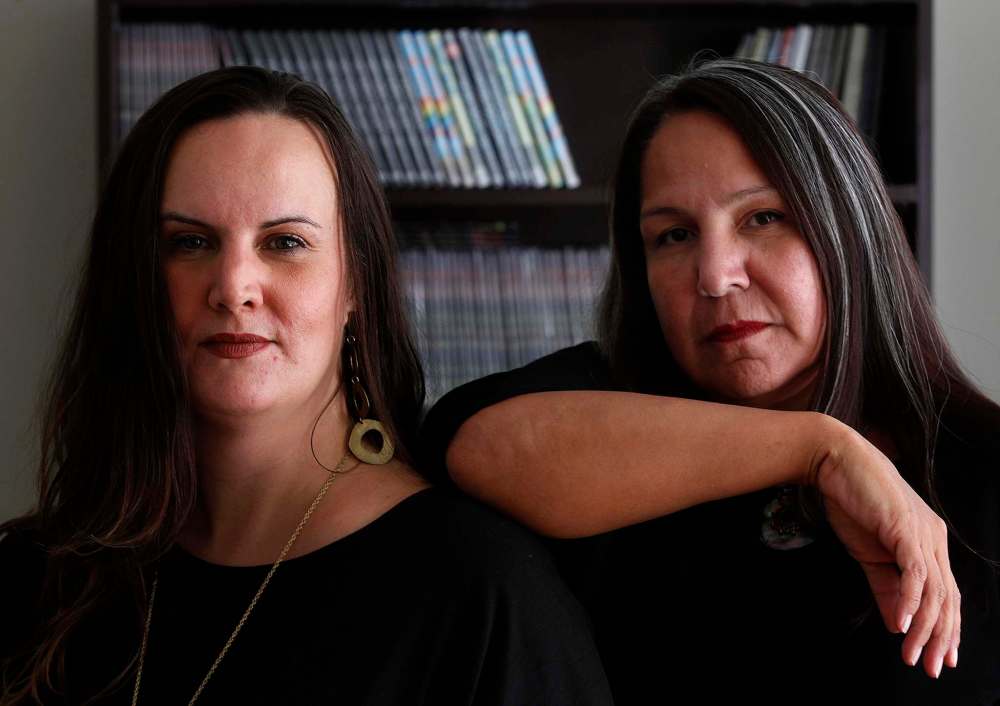
WFP: Above all else, the real stars of First Contact are the Indigenous people who agreed to open their homes and communities to the six participants.
Vanessa Loewen: You see a community member, in the face of this horrible stuff, be so gracious. Those were the shining, prideful moments that probably got us through the editing process.
Stephanie Scott: Intelligence, dignity, smart, beautiful, cultured, sharing their food with them, that was so key, and we saw that time and time again. That’s who we are as Indigenous people. We share. We like to educate.
Vanessa Loewen: Michael Champagne last night posted, and he said something to the effect of… “I’m so happy to get to watch a TV show where Indigenous people and families are the heroes.” I thought that was a beautiful way to put it. The Indigenous people, and little kids, and everybody who participated with us was a hero.
Stephanie Scott: I don’t think I’ve always handled those situations with that much grace. It’s time and time and time again. It builds up, builds up, and you think ‘okay, it’s going to get better.’ Then the next situation will happen. You’ll walk into a restaurant and you won’t be served. You’ll be shopping and somebody will be following you around.
WFP:When the trailer was released online, it quickly spread across social media. Producers were stunned as the trailer went viral; soon, advance buzz for the show surpassed their highest expectations.
Stephanie Scott: You always want that to happen. The trailer went out, it went to 100,000 (views), that’s when I was thinking, ‘that’s going to be great for us.’ Then 200,000, 300,000.. 1 million. Now we’re up to 2.5 (million).
Vanessa Loewen: I think back to 2014, (when) I thought “this is it, this is the moment we’re waiting for, this is what’s going to mobilize people.” But for all the enthusiasm you have to carry over the years as you fundraise, and you do casting, and you get your stuff together, I never once would have thought that it actually would happen.
Steph’s right. 100,000 (views), I was so happy. When we got to a million, we were over the moon, crying, texting each other, calling each other. That was really emotional.
WFP: Many filmmakers dream of generating this level of engagement about such critically important issues. Only a few actually break through. What broadcast alchemy made First Contact able to draw that level of interest?
Vanessa Loewen: It gave members of the Indigenous community a voice, that I witness as constantly being silenced.
Stephanie Scott: You take a look at the trailer. That was kind of the launching pad. You see both voices: you see Indigenous peoples, non-Indigenous peoples. We all know those conversations and statements happen and take place. All of a sudden they’re seeing themselves reflected, and now we’re coming together.
Vanessa Loewen: I’ve been working in this business for over 20 years, and you hear jokes about, ‘oh, what if we took six white people and thew them on the rez?’ It’s always a joke, and I think it happens on both sides. But there’s always this desire to pull back the curtain. That sentiment, that was only coming from a desire to be understood. Because we know that’s what will help to tear down prejudice.
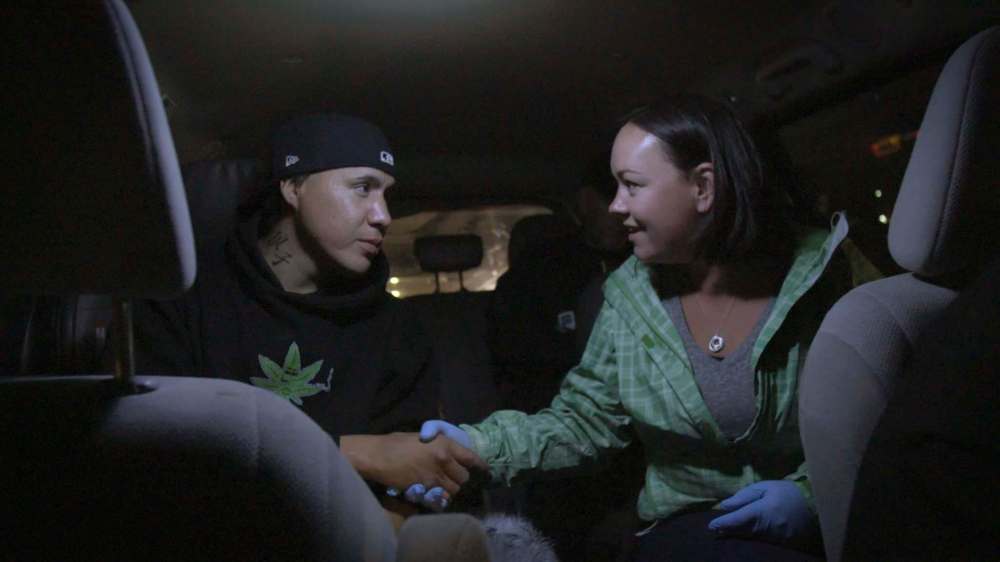
WFP: The show has inspired a vigorous discussion, particularly on social media. In discussions that are insightful, critical and often deeply emotional, Indigenous people have discussed the show’s fundamental approach.
For instance: is it right to ask Indigenous participants on First Contact to give of themselves to people with openly biased views? What does it mean for Indigenous folks to have to educate about their own humanity?
Stephanie Scott: Everyone that we talked to was open, and willing to educate. They didn’t say “we think this is a bad idea.” They wanted to talk about the richness of their community. If you’re just cutting it (the show) down because you believe this is not the medium to do it in, I think we’ve shown that its wrong, because we’ve created a dialogue.
Vanessa Loewen: I was asked a long time ago by a journalist, she said, “do you feel the community is resentful, because why should we have to continue to educate non-Indigenous people?” I can’t speak for everybody, but I don’t think that’s the case. People want to invite people into their homes, have their story heard, share their knowledge and experience… and I can tell you that’s what the people who appeared on our show wanted.
Stephanie Scott: Of course it’s emotional, and triggering seeing it time and time again. But how do you move forward? In regards to the show, that’s why we presented (crisis contact) numbers. It’s super key for people to be able to speak about that, and have someone hear them, and listen. It’s a tough, tough life being an Indigenous person in Canada… unless we come together to support each other, how are we all going to move forward?
WFP: How does it affect the burden of that educating work, that in this case it was controlled by Indigenous people?
Stephanie Scott: I’d rather teach you something from my perspective, and my experience, than something a non-Indigenous person has read in a book and now I’m going to tell you about it.
Vanessa Loewen: That’s why APTN needs to exist. That’s why we need to be producers. Our stories have too long been told with this paternalistic mentality by someone else. As much as it might be a little bit tiring sometimes that “wow, this is the reality,” absolutely the fact we are able to be in control of that stuff (is important).
WFP: Filming just wrapped for a second season, which will air next September. Producers are considering extending the series beyond that. It will change, though, as it goes forward: the question now is where the next steps lie.
Vanessa Loewen: Ultimately, what I hope people know moving forward is that we want the dialogue. This is now about steps towards reconciliation. This is now about what people can do. People want more. All of the social media is people saying they want more. I think, actually, a shocking number of people might now voluntarily sign up.
We don’t want to set people up in any way. We want this dialogue that continues to be positive. I think it will be, with the exception of the few that have kept their views… If there is the potential for future seasons, it will be because people are hungry for more, they want this dialogue to continue.
Stephanie Scott: The outcome of this is, we’ve been contacted time and time again by educators… Just this morning, the two of us got another one from a teacher who wants to show it to her high school class… you always want that storytelling to make that happen, and now it is happening. So it’s a blessing.
WFP: With the show itself now making ripples, what are some next steps for non-Indigenous people who came away from it thinking more about these issues?
Stephanie Scott: There’s always something happening in a city or a local community that connects you with Indigenous people. You can do a little of your own education, so it’s not just Indigenous people providing that to you. There’s numerous reports that have come out. Go to the library, pick one of those up. Look at the Truth and Reconciliation Commission’s 94 calls to action. You want more about residential school? NCTR.ca.
Vanessa Loewen: And if you’re a parent, look at your kid’s curriculum. See if this stuff is included for your children too… take your kids to go make bannock at The Forks in the winter… Just start them young, get them involved.
Our newsroom depends on a growing audience of readers to power our journalism. If you are not a paid reader, please consider becoming a subscriber.
Our newsroom depends on its audience of readers to power our journalism. Thank you for your support.



